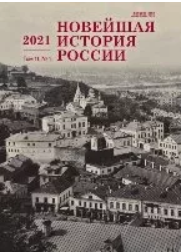Петиционная кампания мусульман Ленинграда по возвращению Соборной мечети в 1946–1955 гг.
The Petition Campaign of the Muslims of Leningrad on the Return of the Cathedral Mosque in 1946–1955
Author(s): Renat Irikovich BekkinSubject(s): Islam studies, Government/Political systems, Politics and religion, WW II and following years (1940 - 1949), Post-War period (1950 - 1989), Inter-Ethnic Relations, Ethnic Minorities Studies
Published by: Издательство Исторического факультета СПбГУ
Keywords: Leningrad; Cathedral Mosque; dvadtsatka; Tatars; Council for the affairs of religious cults; Islam; USSR;
Summary/Abstract: The article examines the petition campaign for the return of the Cathedral Mosque, organized by the Muslims of Leningrad in the second half of the 1940s and the first half of the 1950s. The campaign represents an example of a human rights activity (albeit in a limited sphere, for securing freedom of conscience), and should be taken into account when studying the history of the human and civil rights movement in the USSR. The language and argumentation used by authors of the petitions are analyzed. The article examines the religious life of Leningrad Muslims outside of the mosque (in particular, the holding of festive services at the Tatar cemetery in the village of Volkova). The article touches upon the problem of historical memory. The memories of the struggle for permission to build a mosque in St. Petersburg in tsarist times, preserved among Leningrad Muslims, were taken into account by officials when deciding whether to return this religious building to believers in the 1950s. The problem of returning the mosque is considered in the context of changes in the confessional policy of the country’s leadership. The article demonstrates the role of such a body as the Council for Religious Affairs under the Council of Ministers of the USSR touches upon this role in resolving issues of returning religious buildings to believers in the post-war period. Particular attention is paid to the relations within the Leningrad Muslim community. On the example of the conflict between imam-khatib Abdulbari N. Isaev and Chairman of the twenty (dvadtsatka) Usman Bogdanov, the author examines the system of power relations within religious communities in the USSR in the postwar period. In particular, the article mentions the narrative that Bogdanov proposed to subordinate dvadtsatka directly to the Commissioner of the Council for Religious Affairs in the Leningrad Region.
Journal: Новейшая история России
- Issue Year: 11/2021
- Issue No: 3
- Page Range: 755-775
- Page Count: 21
- Language: Russian

